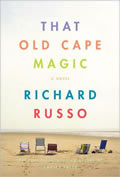 When I think about Richard Russo's latest novel, "That Old Cape Magic" (2009, Alfred A. Knopf, a division of Random House, 272 pp., $25.95), one word comes to mind - annoying. It fell far from the mark, in my opinon, for the Pulitzer Prize winning author of "Empire Falls."
When I think about Richard Russo's latest novel, "That Old Cape Magic" (2009, Alfred A. Knopf, a division of Random House, 272 pp., $25.95), one word comes to mind - annoying. It fell far from the mark, in my opinon, for the Pulitzer Prize winning author of "Empire Falls."I only started to be less annoyed and actually begin to like the book and its protaganist, Jack Griffin, about two-thirds of the way through. That was when he and his wife separated and Griffin seemed to regain some humility. The pages preceding described ad nauseum Griffin's unhappiness with himself and his marriage.
True to her name, Griffin's wife, Joy, always looks on the bright side of their outwardly successful life, their well-adjusted daughter. Griffin wallows in doom and gloom, haunted by his own parents' seemingly unhappy union. It's as if he can't see the good in his life. His wife, his daughter, his career.
That's where it became tedious for me. Much of the book was about the marital argument. Who's right? Who's wrong? Who can do the most damage to the other without even trying? Ugh.
The novel begins and ends with weddings - one on Cape Cod and the second on the coast of Maine - just a year apart. One dead parent accompanies Griffin via ashes in an urn is his trunk to the first, another to the second.
Cape Cod was the stuff of Griffin's parents dreams. The family would summer there in rental homes, never able to afford to buy a place in their shangri-la. They would spend summers poring over real estate books, putting the properties they surveyed into two groups: "Can't Afford It" and "Wouldn't Have it as a Gift." Their dream was unattainable.
Griffin's parents taught college English and history courses at a midwest college, never quite making it to the bigtime - the Ivy League, and never seeming to have enough money to follow their dream of moving to the Cape fulltime. Their marriage crumbles late in their lives. Following her death, Griffin paints his mother as the unhappy voice in his head. Griffin unwittingly repeats his parents' mistakes in his own life.
More than once, when Griffin was hearing his dead mother's commentary in his head, I was reminded of Norman Bates being haunted by his mother's voice. I found the allusion creepy rather than comic, as the Washington Post's book reviewer seemed to find it: "It's a sign of Russo's comic genius that these two hilariously acerbic parents - one on the phone, the other in an urn - just about steal the show," wrote Ron Charles for the Post.
Like his parents, Griffin ends up a professor. He does them one better by ultimately landing at a private Connecticut college, where he yearns for his days as a screenwriter in LA. By the time this story begins, his 34-year marriage is on the decline, his daughter has grown up and doesn't need him, and he is in the middle of a midlife meltdown. The year-long span of the story details Griffin's experience with that meltdown.
What Russo does best is make us like the regular guy - Jack Griffin (for me, that affection was won after a time) despite his insecurities and his foibles. He also weaves plots, describes relationships (with the dreaded in-laws and siblings), and creates scenes that ring true with poignancy, humor and grace: The elder Griffins' beach rentals; the horrible wedding catastrophy where half the wedding party ends up at the local hospital.
All told, the Russo magic just wasn't in this one for me.
Nonetheless, I wouldn't be surprised to see the story on the big screen soon: I can picture the novel, with its two weddings and two funerals, failed and redeemed relationships, and the sometimes cliched Cape reminisences, easily translating to film.
No comments:
Post a Comment